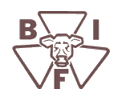Technical Keynote Session 4
Weight Trait Project
During discussion of advancements in genetic prediction, at the 2009 Beef Improvement Federation (BIF) symposium, Cornell University geneticist John Pollak described the Weight Trait Project (WTP) – a collaborative effort of Cornell, the U.S. Meat Animal Research Center (USMARC) and the University of Nebraska. Pollack said the project is designed to further implementation of DNA-based selection in conjunction with expected progeny difference (EPD) values.

John Pollak, Cornell University
According to Pollack, breed associations have identified seedstock breeders in the region surrounding USMARC’s Clay Center, Neb., facility that will provide DNA samples on 1,000 animals per each of seven breeds. Igenity® has agreed to serve as genetic service provider by genotyping all 7,000 animals.
Marker effects will be estimated using information collected from the seedstock producer in conjunction with USMARC data. Resulting molecular breeding values (MBVs) will be validated using university herd records.
“To examine the impact of integration of MBVs into the calculations of EPDs, we will compute EPDs for animals in the herds providing DNA,” Pollak explained. “Those results will be compared for improvement of accuracy in the evaluations of yearling bulls.”
Pollak said that while there has been much discussion about the value of moving DNA information into genetic evaluation, there has been little preparation for it. The Weight Trait Project, he added, represents a unified effort among researchers, breed associations, seedstock producers and a DNA testing company, to improve the process of developing and validating DNA tests and to investigate the infrastructure necessary for the flow of information needed to deliver marker-assisted EPDs.
“This project forces us to investigate issues we may have been ignoring over the last couple of years,” Pollak stated.
In the future, he hopes to see the project replicated in different production environments and expanded to involve more breeds.
Editor’s Note: This summary was written under contract or by staff of Angus Productions Inc. (API). To request reprint rights contact Shauna Rose Hermel, editor, at 816-383-5270. PowerPoints are posted with permission of the presenter and may not be reproduced in whole or in part without the express permission of the presenter.
The 41st BIF Research Symposium and Annual Meeting was hosted by the California Beef Cattle Improvement Association and the California Cattlemen's Association. For more information, visit www.bifconference.com or www.calcattlemen.org/bif2009.html.



